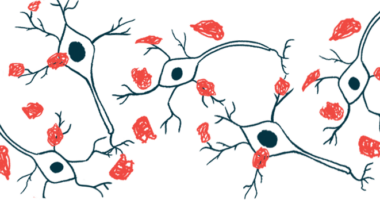AT-02, to clear amyloid deposits, named orphan drug by FDA
Therapy in enrolling Phase 2 trial for transthyretin amyloidosis, including FAP

The U.S. Food and Drug Administration (FDA) has given orphan drug designation to AT-02, Attralus’ investigational candidate for the treatment of transthyretin amyloidosis (ATTR), a group of diseases that includes familial amyloid polyneuropathy (FAP).
Orphan drug status supports the development of potential treatments for rare diseases, those affecting fewer than 200,000 people in the U.S. It offers benefits like tax credits, exemption from certain fees, and seven years of market exclusivity should the treatment be approved.
Gregory Bell, MD, Attralus’ chief medical officer, said in a press release that the company was pleased with FDA support given to AT-02, a treatment designed to break down abnormal and damaging protein deposits.
Earlier this year, AT-02 also was designated an orphan drug in the European Union (EU) for this indication. In the EU, a rare or orphan disease is considered to affect less than 1 in every 2,000 people.
Current approved treatments cannot remove existing amyloid deposits
Amyloidosis is an umbrella term for a group of conditions marked by the buildup of toxic protein clumps, called amyloid deposits, that are damaging to organs and tissues.
ATTR is a form of amyloidosis where amyloids are made of a protein called transthyretin (TTR), and FAP is a hereditary form of ATTR that mainly damages the peripheral nerves, or those outside the brain and spinal cord. As a result, a hallmark FAP symptom is nerve damage, such as numbness and weakness (peripheral neuropathy) in the body’s extremities. Other organs and tissues can also be affected.
When amyloid deposits mainly accumulate in the heart, the disease is called ATTR cardiomyopathy, and it can occur with or without genetic mutations.
While ATTR amyloidosis has no cure, available disease treatments can lower production of the TTR protein and the subsequent formation of toxic clumps, helping to ease symptoms and slow disease progression.
However, these medications cannot clear the body of already existing deposits.
“Current approved therapies for ATTR target precursor protein production, reducing the formation of new amyloid, but there is a significant unmet need for new therapies that can remove the existing toxic amyloid fibrils,” Bell said.
In developing AT-02, scientists used the company’s proprietary pan-amyloid binding peptide, a short protein designed to bind to all types of amyloid deposits. The protein is fused to an antibody, which triggers an immune response to clear the amyloid deposits bound by AT-02.
Administered directly into the bloodstream, AT-02 and like therapies under development “are unique in their ability to target, engage and remove all types of toxic amyloid,” the company states on its website.
Phase 2 trial enrolling adults with ATTR, other systemic amyloidosis forms
AT-02 uses a peptide similar to that in AT-01 (124I-evuzamitide), Attralus’ potential diagnostic imaging agent to help in detecting systemic, or bodywide, amyloidosis. In clinical studies, AT-01 has been shown to distinguish ATTR from other forms of amyloidosis, and the company anticipates moving the agent into Phase 3 testing next year.
Preclinical studies showed that AT-02 can bind to several types of amyloid deposits, including those made of the TTR protein. In a mouse model of systemic amyloidosis, AT-02 was found to travel to the heart, where it bound to amyloid deposits. It also was reported to lower the levels of amyloid clumps deposited in the heart, kidneys, and liver.
AT-02 is being tested in a three-part Phase 1 clinical trial (NCT05521022), and its open-label and long-term Phase 2 study (NCT05951049) is enrolling adults with ATTR or other forms of systemic amyloidosis.
The Phase 1 study is evaluating the safety, tolerability, and pharmacological properties of single and multiple ascending doses of AT-02 in up to 100 healthy volunteers and systemic amyloidosis patients. Participants will be followed for nearly three months.
People who complete this trial, along with other adult patients, can enroll in the extension Phase 2 study, which plans to recruit up to 120 eligible adults, ages 18 to 85, at sites in the U.S., Australia, and the U.K. All will be treated with AT-02 by intravenous infusion once every two or four weeks for about two years.







